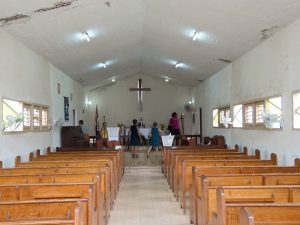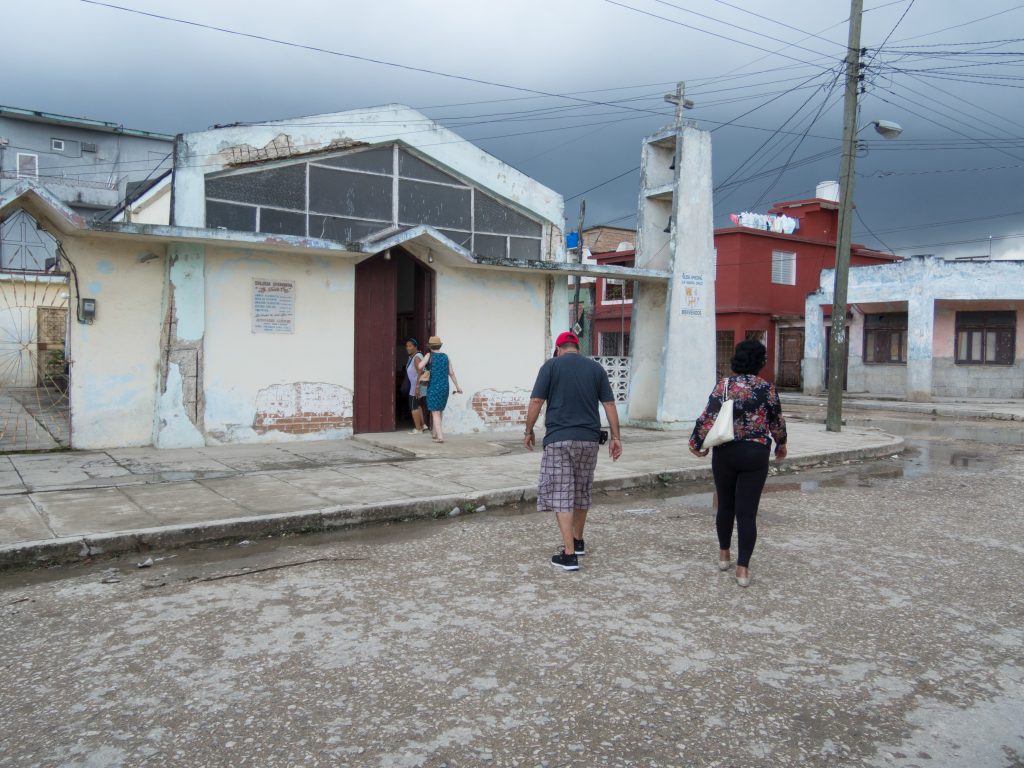by Roger H. Martin
St. Luke’s Episcopal Church in Darien, CT has been working with Episcopalians in Cuba for several years now, providing support to the local church there. Since reporting on the St. Luke’s visit to Cuba in April 2016, much has happened at the national level both in Cuba and in the United States. First, Fidel Castro, Cuba’s head of state since 1959, died leaving his brother to run the country. And then, this past November, a new American president was elected whose position on America’s relationship with Cuba is still not clear including whether the Embargo will ever be lifted. This has left many Episcopalians (both in the USA and in Cuba) wondering whether the normalization agreement signed by President Obama and Raoul Castro in 2014 will continue. Episcopalians in both countries are concerned that it might not and that once again the Episcopal Church in Cuba will be isolated from the Episcopal Church in the United States as happened in 1959.
St Luke’s along with many other parishes and individual Episcopalians across the U.S., are taking action, believing that the bond between the Episcopal Church in both countries must be maintained no matter what happens politically— in either country.
To this end, St. Luke’s sponsored another trip to Cuba this past April. Our mission this time was to choose a companion parish with whom to partner. Additionally, they donated some $3,700 raised through a 5K run on All Saints Day last November (“Run with the Saints”) that will support the Diocesan youth summer camp in Havana this coming August, and arranged the transfer of $60,000 raised by another St. Luke’s fundraising effort to support work on Camp Blankingship, a critically needed facility in central Cuba that, among other things, will allow the Cuban church to minister to the needs of its youth who are coming to church in record numbers as well as to hold conferences for adults and visitors from all over the world. Initially, it wasn’t clear whether they would be able to get the $60,000 into the country since the US Internal Revenue Service has severe restrictions on U.S. dollars that can be brought into the country due tot he long-standing embargo. Additionally, Trinity Wall Street recently announced a gift of $173,500 to renovate the Diocesan Center in Havana.
At the behest of Bishop Griselda Delgado Del Carpio, six members of St Luke’s and a member of Christ Church, Greenwich as well as a recent graduate of General Theological Seminary, journeyed to the Episcopal parish church in Santa Cruz del Norte, a community an hour east of Havana to explore the possibility of having this church become a companion parish of St. Luke’s.
Santa Cruz del Norte is a former company town of the Hershey Chocolate Company which today accommodates a large Havana Club Rum production facility. The town numbers 20,000 people and is one of the poorest communities in the country. The Episcopal Church was established here in 1910 as the first Christian church in the community. In the late 50’s and early 60’s though, almost all of the Church’s fled Cuba and resettled in Florida, leaving the church practically abandoned. Today, under the leadership of Father Frank Fernandez and his dynamic wife Mabel, the church has grown back from almost nothing to 90 adult members and 20 children, many of whom come to church without their parents.
 This church’s needs are big and small, giving St. Luke’s a wide range of future projects to support. For example, like many structures in Cuba, the church itself is in terrible condition with a roof that is badly deteriorating to the point where it is dangerous for small children to worship there for fear that it might collapse. But with only $30,000, not only can the church be repaired and the roof replaced, but in an empty lot behind the church, a separate two-story structure can be built that will include a community center on the first floor and income-producing rental dormitories on the second.
This church’s needs are big and small, giving St. Luke’s a wide range of future projects to support. For example, like many structures in Cuba, the church itself is in terrible condition with a roof that is badly deteriorating to the point where it is dangerous for small children to worship there for fear that it might collapse. But with only $30,000, not only can the church be repaired and the roof replaced, but in an empty lot behind the church, a separate two-story structure can be built that will include a community center on the first floor and income-producing rental dormitories on the second.
But there are smaller needs and the following examples will probably define the needs of many Episcopal churches in Cuba. Before we left the United States, Father Frank asked us to bring a suitcase filled with nonprescription medicines that are not available in Cuba, including cough syrup, aspirin, suntan lotion, and Band-Aids. He also asked us to bring arts and crafts material for the children, including crayons, pencils, and paper. Father Frank later told us that creative gifts for future trips might include:
- Equipment (gloves, balls and bats) to field two baseball teams as a way to help recruit more children to the church. Baseball is Cuba’s most popular sport!
- Funds to purchase washing machines so that women in the parish can operate a small laundry business that would provide the church much needed revenue.
- Water purification equipment (about $4,000 each) to provide clean water for the entire Santa Cruz Del Norte community,
- Silver polish so that chalices that are severely tarnished can again be used in communion.
- Clerical vestments.
- A boom box for music during church services.
St. Luke’s now plans to provide annual support for the parish, form a close connection with Fr. Frank and his congregation, and visit whenever possible.
In addition to St. Luke’s efforts, a new group called the Friends of the Episcopal Church of Cuba (or ECC), has been formed. This organization, which is separate from St Luke’s, will help coordinate a USA–wide effort to support the Episcopal Church in Cuba. The mission of this new group is to harness US connections to enable Bishop Griselda to achieve her vision and seven year strategic plan. According to its website, this group has set out to accomplish several important things.
- To catalogue Episcopal churches in the United States already engaged in supporting the Cuban church.
- With the help of Bishop Griselda, to list Cuban Parishes that need American support, categorizing them according to the severity of their needs.
- To provide examples of parishes in Cuba that are fully operational and are models of what can be accomplished.
- To describe the Camp Blankingship project that will provide a crucial resource for the Cuban church nationally.
- Create a 501 C (3) charitable foundation that will enable American Episcopalians who provide financial support for the Cuban Church to receive all the benefits afforded by the U.S. tax code.
- To share other needs of the Cuban church, including a pension fund to support church personnel, the creation of an endowment to support the Diocese, the provision of vehicles like motorcycles so that priests can more effectively and efficiently serve several parishes, and the provision of water purification systems that serve not only the churches where they are installed but the entire community.
- And finally, to provide a poster board so that news about the Church in Cuba and what is being done in the United States to support it can be shared.
As the American Episcopal Church gets more involved with their brothers and sisters in Cuba there will be many more trips like these. If your parish is interested in supporting the Episcopal Church in Cuba, they encourage you to use the resources that have already been established. St. Luke’s has made two trips now and another will be made in the Fall so much is known about the sometimes convoluted visa process, where to stay in Havana, and how to contact the Diocesan Center so that Bishop Griselda knows you are coming. To this end, please be in touch with the Friends of the Episcopal Church of Cuba.
The Episcopal Churches in Florida have pioneered this effort. Now it’s becoming a nation-wide project. So, it’s important that we are all in touch with each other.
Roger Martin, a member of St. Luke’s in Darien, Connecticut, was associate dean of Harvard Divinity School as well as the president of two liberal arts colleges. In retirement he writes about higher education and serves as a director of the British Schools and Universities Foundation in New York City.
All images courtesy of Roger Martin

